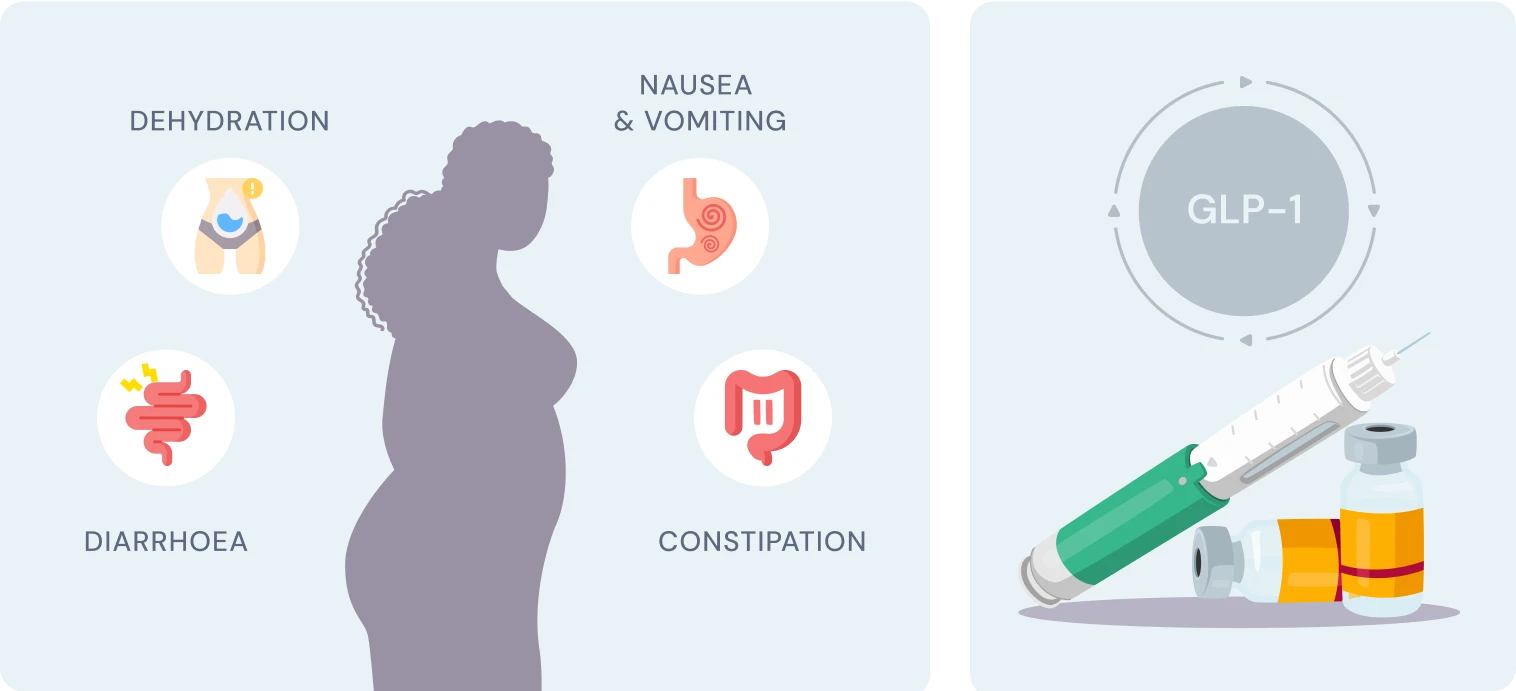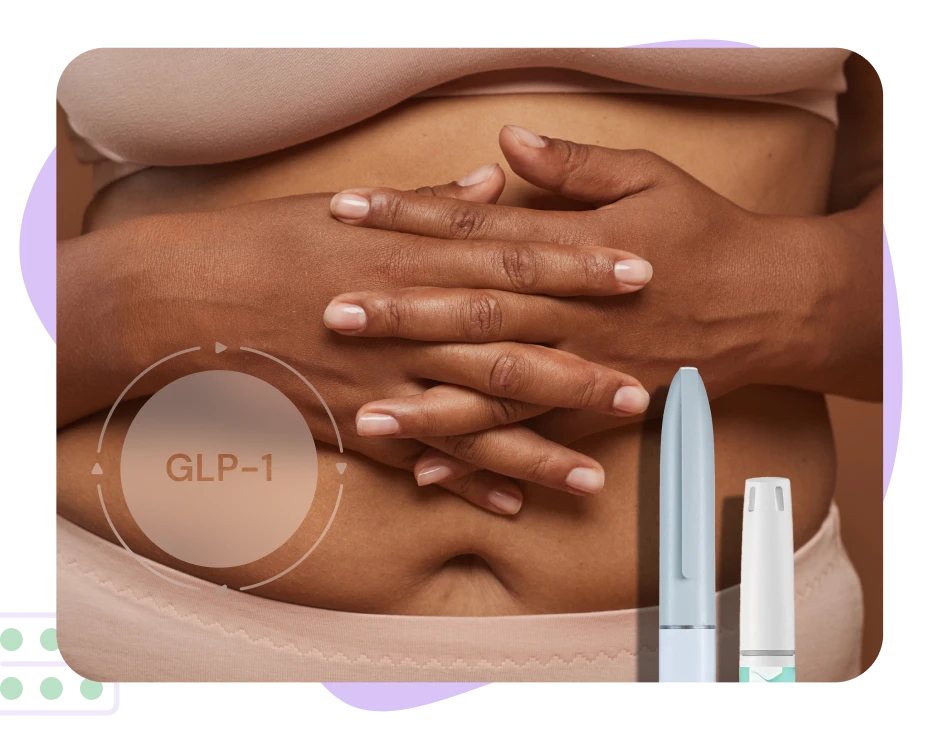Weight loss injections like GLP-1 medications have become a popular treatment for weight management in people living with obesity or those who are overweight with related health conditions. While these treatments can deliver impressive results when used properly, they often come with several Common GLP-1 Weight-loss Side Effects that you should be aware of.
Many people experience symptoms like feeling sick, being sick, bloating, runny stools, constipation and even sulphur-smelling burps. Understanding these common reactions and learning how to manage them can make your treatment journey much more comfortable.
Some side effects can actually be due to the weight loss itself. Losing a significant amount of weight—typically more than 10kg—can make other medications more effective. For example, if you are taking blood pressure or cholesterol-lowering medication, the same dose may become too strong after substantial weight loss. This can lead to side effects such as dizziness caused by low blood pressure. It’s important that patients have regular check-ins with their Healthcare provider to review and adjust medication doses as their weight changes.
If you’re considering or already using these medications, knowing what to expect can help you prepare and work with your healthcare provider to minimise discomfort while still benefiting from the treatment.

Stomach and Digestive Side Effects
Digestive problems are the most common issues experienced by patients taking GLP-1 injections. These side effects are usually worst during the first few weeks of treatment and after dose increases, with most people seeing improvement over time.
Nausea and Vomiting
- When it happens: Often worse when starting treatment and after increasing doses
- How to manage it: Eat smaller, more frequent meals; avoid fatty or spicy foods; drink plenty of water; talk to your doctor about anti-nausea medications if needed
- Will it get better? Most patients report major improvement within 4-8 weeks
Bloating
- When it happens: Common after meals, especially larger ones
- How to manage it: Eat smaller meals; chew thoroughly; avoid gas-producing foods like beans and cabbage; limit fizzy drinks; take gentle walks after meals
- Will it get better? Usually improves as your body gets used to the medication within a few weeks
Diarrhoea
- When it happens: May occur suddenly, especially after fatty meals
- How to manage it: Try eating rice, applesauce, potatoes, bananas and toast during bad episodes; avoid foods that trigger symptoms; consume foods with soluble fiber; stay well-hydrated; consider over-the-counter medicines for temporary relief
- Will it get better? Typically decreases in severity after 2-4 weeks of treatment
Constipation
- When it happens: Often develops gradually after starting treatment
- How to manage it: Gradually increase fiber intake; drink plenty of water; exercise regularly; establish regular bathroom routines; consider gentle laxatives if needed
- Will it get better? May persist longer than other side effects but usually improves with proper management
Sulphur Burps
Will it get better? Many patients report this symptom diminishes within 6-8 weeks
When it happens: Often after consuming certain trigger foods
How to manage them: Identify and limit trigger foods; eat smaller meals; avoid fizzy drinks; talk to your doctor about activated charcoal tablets
- When it happens: Often worse when starting treatment and after increasing doses
- How to manage it: Eat smaller, more frequent meals; avoid fatty or spicy foods; drink plenty of water; talk to your doctor about anti-nausea medications if needed
- Will it get better? Most patients report major improvement within 4-8 weeks
Other Common Side Effects
Dry Mouth
- When it happens: Throughout the day, often worse after meals
- How to manage it: Drink more water throughout the day; use alcohol-free mouthwashes made for dry mouth; chew sugar-free gum to help produce saliva; ask about artificial saliva products
- Will it get better? Usually persists while on medication but can be effectively managed
Dehydration
- When it happens: Results from vomiting, diarrhoea, or not drinking enough
- How to manage it: Drink at least 2-3 litres of water daily; check your urine colour (should be light yellow); use rehydration drinks if losing a lot of fluids
- Will it get better? Resolves quickly with proper fluid intake but requires ongoing vigilance
Serious But Less Common Side Effects
The MHRA highlights several serious but less common risks that patients should know about1:
- Gallbladder problems: Including gallstones
- Pancreatitis: Inflammation of the pancreas, which can require hospitalization
- Allergic reactions: Can include swelling, rash, and trouble breathing
- Low blood sugar: Can happen even in non-diabetic patients using GLP-1s for weight loss
- Hair loss: Some patients report temporary thinning of hair
Warnings About Misuse
Healthcare professionals are concerned about people using GLP-1 medications inappropriately just for cosmetic weight loss. The benefits and risks of using these medicines for weight loss in people who aren’t obese or overweight with health problems haven’t been studied.
Doctors warn that complications can be worse if the drugs are misused, for example, taken to lose a few pounds or bought from unregulated online sellers. Doctors have seen dangerous, life-threatening problems like inflammation of the pancreas in such cases.
Advice for Patients
- Only use GLP-1 medications under proper medical supervision
- These are prescription-only medicines that should only be prescribed by registered healthcare professionals
- Stay well-hydrated throughout treatment
- Report any concerning side effects to your doctor promptly
- If getting a private prescription, make sure it comes from authorized sources, like registered pharmacies
- Read the Patient Information Leaflet carefully and follow the prescribed dose
When to Call Your Doctor
Contact your healthcare provider immediately if you experience:
- Cannot keep fluids down for more than 24 hours
- Signs of dehydration (extreme thirst, dark urine, dizziness)
- Severe or persistent stomach pain
- Fever along with digestive symptoms
- Blood in vomit or stool
- Symptoms that seriously affect your daily life despite trying to manage them
GLP-1 medications can be effective tools for weight management when used appropriately, but patients should know about potential side effects and how to manage them. Talk to your healthcare professionals to discuss both common and serious risks before taking these medications.
You may also book an appointment with PillSorted to discuss any of your GLP-1 side effects.
FAQ
What are GLP-1 medications and how do they help with weight loss?
GLP-1 medications are prescription injections that mimic a hormone called glucagon-like peptide-1. They help regulate appetite, slow stomach emptying, and improve blood sugar control, which can support weight loss in people who are obese or overweight with health conditions.
Are the side effects permanent?
Most common side effects—like nausea, bloating, and diarrhoea—tend to improve within a few weeks as your body adjusts. Serious side effects are rare but may require immediate medical attention.
Can I prevent nausea or vomiting when starting GLP-1 treatment?
Yes. Eating smaller meals, avoiding fatty or spicy foods, and staying hydrated can help. Starting on a lower dose and gradually increasing it may also reduce symptoms. Always follow your doctor’s dosing plan.
Can I take GLP-1 medications if I only want to lose a small amount of weight?
No. These medications are intended for people with obesity or those who are overweight with related health issues. Using them for cosmetic weight loss or without medical supervision can be dangerous.
When should I stop taking the medication or seek medical help?
Stop and contact your doctor immediately if you experience severe abdominal pain, signs of dehydration, vomiting that lasts more than 24 hours, or any symptoms that interfere significantly with daily life.
Related
- Bloating from GLP-1 Injections
- Common GLP-1 Weight-loss Side Effects
- Constipation from GLP-1 Injections
- Dehydration from GLP-1 Injections
- Diarrhoea from GLP-1 Injections
- Dry Mouth from GLP-1 Injections
- Injectable Weight Loss Treatments (GLP-1)
- Nausea & Vomiting from GLP-1 Injections
- Sulphur Burps from GLP-1 Injections (Mounjaro, Wegovy): How to Manage Them
- Weight Loss





























